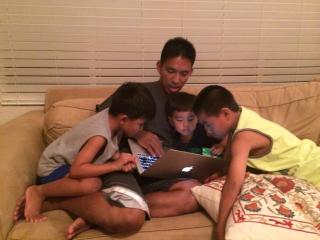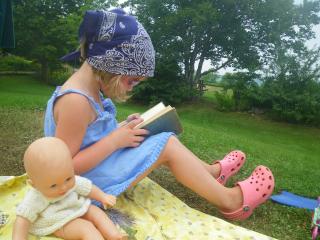
I want to start with a disclaimer. The photos are all wrong. I requested photos from unschoolers of "children reading or seeming to read." The photos were varied and wonderful. But to discuss how children learn to read naturally, a photo of a child with a book is missing the point.
In the 19th and early 20th centuries, many families owned few to no books, but schools had books, and so children who wanted to read went to school. In the late 20th and early 21st centuries, print is everywhere. There is more print available in your home, probably, than was in my elementary or Jr. High school library and textbook storage room. And with the internet, you have more than the library at my university had. But that, too, misses the point.
There are many things children can read besides books:
|
advertising flyers billboards birthday cards post cards captions comics directions for kits doors charts, graphs plant guides bird guides cereal boxes DVD cases food packages game instructions gravestones grocery lists historical markers instant messages instructions leaflets letters from Grandma license plates magnetic poetry words maps subway posters |
graffiti manga marquees catalogs menus games Minecraft chat phone messages Pokemon cards political yard signs price stickers Amazon listings programs recipes score cards Skyrim dialogue skywriting street signs trivia games guide signs warning signs wikis window signs zoo signs one's own diary home-made books |
 photo by Janice Casaminia Ancheta |
According to the recent book Bad for You: The War Against Fun, Plato feared and objected to people learning to write, because it would keep them from developing the good memory necessary for Greek oratory. I didn't know that, when I discovered how much my daughter Holly could learn and do without reading.
I expected Holly to learn to read earlier than her brothers had. I thought her "late reading" would hold her back, but in ways I had not foreseen, it launched her forward.
When she was nine or ten and spoke at a Girl Scout ceremony, other girls were holding their written reports and mumbling into the microphone as they mispronounced words they had copied from a book but never heard or read aloud. Holly stood, poised, and SPOKE—didn't read, because she couldn't. She was the only one who "spoke" that night. The other girls failed, in public, to read fluently.
When Holly was in a play and couldn't depend on the script, she spoke the lines we had helped her learn at home, and in waiting for her cues, she learned all the parts. During the play, she was the prompt for the other child actors who were lost onstage without the script they had depended on.
When she did learn to read, she was 11. A homeschooled (not unschooled) neighbor who was ten wasn't reading, and her mother pressured her by saying "You don't want to be like Holly." The mother assigned the girl to read a Judy Blume book. Sometimes she couldn't play because she hadn't finished her reading. Holly asked me to buy her a copy of the same book; I did. Holly would follow along as the other girl stumbled aloud through the book, chapter by chapter, and Holly learned to read during that process. After waiting for the other girl to be able to move on to other chapters, Holly got impatient and read the rest on her own. I don't think the neighbor ever did finish that book.
After one other Judy Blume book, Holly said, "Wasn't Stand By Me based on a Stephen King novel?"
We went and bought Different Seasons, a collection of King novellas, containing "The Body," on which her favorite movie was based, and she read that. She understood it, reading aloud to me sometimes when something excited her. She told me why she thought some elements had been changed or left out, for filmmaking reasons.
Ever since then, Holly has liked to see a movie and then read the book, happy to figure out what filmmakers can't do, that authors can, or the other way around. Unlike readers who attach themselves to a book, determined to hate any variations, Holly sees great value in both.
With difficulty, because he kept interrupting, I tried to tell that story to an education professor in Australia.
I should back up. When I was in Australia in March 2014, there was a TV program about unschooling. It showed an American family that wasn't a very good example and didn't come across attractively. As I watched with my Australian host family, we all cringed. Then they showed an Australian family whose sons were grown. One had a PhD. Another said he was not a very good reader. The others were in between, on that continuum.
"For balance," a professor was asked for his opinion, and he went off on why unschooling should be illegal and how neglectful the parents were because they had one son who read late. Honestly, the late-reading young adult son seemed calmer and more sensible than the professor was.
One thing led to another, and I ended up at a Melbourne TV station at 7:00 a.m. that Monday morning for a very brief interview. The same professor had been invited. We weren't in the same room, but we were in the same building at the same time, and he said he wanted to meet me afterward.
What he wanted to explain (as he had just tried on live national TV, and as he had in the show earlier in the weekend) was that no human can possibly learn to read without being taught by a professional educator.
I tried to tell him about Holly, he kept interrupting and saying no. The producer assigned to me for the morning was with us; we were standing between the entry and the security desk. The professor I will politely decline to name kept repeating himself, that reading cannot be learned without a highly-trained teacher. I kept trying to slip in bits of my story, because he didn't want to hear it.
When I finally got to the part where Holly finished the book before her friend, he said, "SEE? They taught each other." I said no they had not, and the next thing Holly had read was Stephen King. He said, "No."
First, the friend still couldn't read fluently. How did she "teach" Holly to read when she couldn't even finish a Judy Blume book herself? (As far as we knew, in those days, she never did finish the book.) And IF (just if) she could have taught Holly to read, and Holly had in that same time taught her friend to read, that negates the claimed necessity of having a "highly trained teacher." (There is a link to the video below.)
But let's go back to school.
 photo by Quita Gray
|
School identifies many tricks and stages before that point, and calls them "reading." Suppliers of books and materials for schools create "beginning readers" and worksheets to go with them that can create the illusion that a child can read, because words are carefully chosen and sentences are simple and short. A child who "can read" a second- or third-grade reader might not have a clue if you ask her to read an email from Grandma, or an article from a magazine or newspaper. "I can't read that," she will say, and it's true. If it's beyond the carefully designed reading level she's working on at school, she doesn't have the tools.
School claims credit for every child who learns to read after he enters school. Schools don't accept blame for every child who is told he is a non-reader. They don't see how school itself creates the need for remedial reading, nor how much damage is done by holding children back a grade (or two) because of their reading. It's always because of reading, and overwhelmingly it's boys.
Schools can persuade young children that they are so far behind they will never catch up. Schools can make it true. Schools can beat down a hopeful child in such a way that he will cringe at the sight of books or libraries for seventy years, if he lives that long. They have done it a million times.
Y'know when people say "Don't try this at home"?
Homeschoolers can do the same kind of damage school does, if they are not Very Careful not to.
I have not seen an unschooler fail to read. Enthusiasm and pride will accompany the moment the child can read, regardless of the age, if parents don't screw it up.
Before a child can read, He Cannot Read. Lessons and pressure won't help. It's not making sense yet. One day the marks become words, IF he has not been pressured and shamed, rushed and blamed.
When Holly could read Stephen King, it was partly because she had a large vocabulary. She knew the words when she saw them. We weren't limiting her world to "first grade material" when she was six and "second grade material" when she was seven. She was in situations and conversations with people of many ages, about real-world things. She watched movies and television shows, heard things read, that were not designed for "her grade level," because she never had a grade level. She was living in the world. And when she read, she read as real people read.
Early in my unschooling days, others would try to persuade me that my children COULD read, when they couldn't, because they could tell a McDonald's logo from Burger King's, or because they could recognize their own names. In school, those things are "reading readiness" or "reading preparation." I wasn't interested in that. My children were busy learning.
Part of the reason I and others point and say that unschoolers "read late" is that we bypass all the stages that help justify teachers' salaries, that help children read where to put their name on a math paper, or what page to turn to in their science books. We call it reading when it is as real and as useful as reading ever gets. People who are unaware that reading is a suddenly-acquired skill imagine, then, that at the age of nine, or eleven, the child will spend a year on first-grade books and phonics exercises, and then a year on second-grade reading and spelling rules, and so forth. They are looking at the world through school-colored glasses.
While some children are spending hundreds of hours preparing to read, or practicing little reading "skills," unschoolers are learning about geography, history, music, art, reasoning, humor and all the things some people thought required reading. How much more behind are those children who have been "studying reading" for a year or five before they read!
This originally appeared in print and online as part of a series called Unschooling Around the World, in The Homeschooler magazine, Winter 2015. That publication was not maintained.
The bio notes when this was first published:
Sandra Dodd speaks in public sometimes, but writes every day. She is usually home in New Mexico with her husband, Keith and her now-grown daughter, Holly. Marty will be newly married by the time this issue comes out, and Kirby is considering a move back to New Mexico from Texas next year.
Jo Isaac's survey with graphs of ages at which unschoolers learned to read: Reading age in unschooled kids, July 2016


